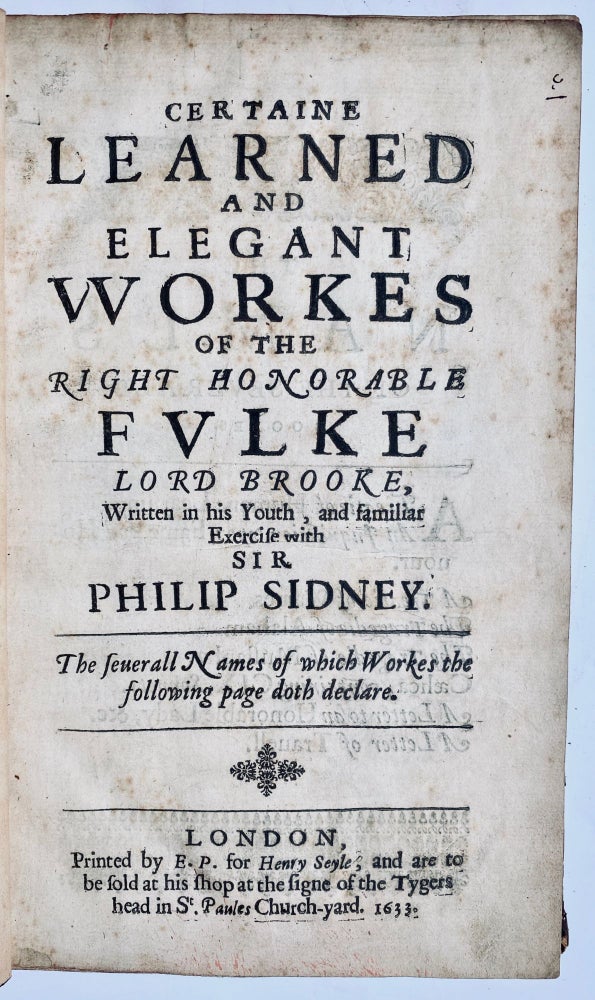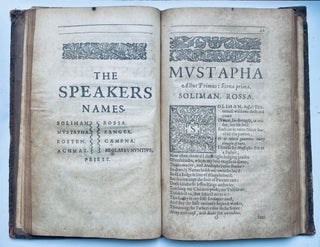Certaine Learned And Elegant VVorkes Of The Right Honorable Fvlke Lord Brooke, Written in his Youth, and familiar Exercise with Sir Philip Sidney. The seuerall Names of which Workes the following page doth declare.
London: Printed by E.[lizabeth]P[urslowe]. for Henry Seyle, and are to be sold at his shop at the signe of the Tygers head in St. Paules Church-yard, 1633. This copy is in good condition internally with only the usual minor dampstaining, and closely trimed . It is bound in full nineteenth century calfskin, ruled in gilt with edges stained safron. The binding has been skillfully rebacked . Folio:8 1/4 X 5 1/2 inches: π2; d-k4, L2, D-Z4, Aa-Qq4 Rr6, This copy is complete, lacking the first and last blank leaves.
In all the known copies of this work the pagination begins with p. 23, signature d. It is generally believed that the book originally began with "A treatise on religion" said to have been suppressed by order of Archbishop Laud. Grosart thinks the missing pages were prefatory matter containing a life of the author "with fuller details of his murder than his friends cared to let the world read" as stated in Biographia Britannica. cf. Memorial-introd. in Grosart’s edition of Brooke’s works, 1870, and Grolier Club, Catalogue of ... works ... from Wither to Prior, 1905. STC 12361,; Grolier’s Wither to Prior, # 406; Pforzheimer 437.;Hayward #68; Greg, II, 489; III, p. 1068-69. Item #771
“Fulke Greville, afterwards Lord Brooke, who wrote (but did not publish) at the end of the sixteenth century a miscellaneous collection of poems called Caelica. The collection consisted of one hundred and nine short poems, on each of which the author bestowed the title of sonnet. Only thirty-seven, however, are quatorzains. The remaining seventy-two so-called ‘sonnets’ are lyrics of all lengths and in all meters. There is little internal connection among Brooke’s poems, and they deserve to be treated as a series of independent lyrics. […] The series was published for the first time as late as 1633, in a collection of Lord Brooke’s poetical writings. It may be reckoned the latest example of the Elizabethan sonnet-sequence.” (quoted from page 304, Cambridge History of English Literature, vol. III)
“If Fulke Greville, first Lord Brooke (1554-1628), had been born twenty years later, he might perhaps have stood —with Chapman rather than with Donne— in the forefront of the metaphysical movement.
¶ What Edward Phillips called his ‘close, mysterious and sentencious way of writing’ is nearer the metaphysical than the Spenserian manner, yet Greville shows, in Humane Learning, a Hobbesian distrust of metaphor, and his normal utterance is of a massive realistic plainness fitted for sober and penetrating thought. In parts of Caelica, which was begun under Sidney’s inspiration, he wreathed iron pokers into true-love knots, and although, according to Naunton, he ‘lived, dyed, a constant Courtier of the Ladies,’ no series of love poems was ever less amorous. For all the Petrarchan and Sidneian fancies, and the omnipresence of Cupid, Caelica, Myra, and Cynthia are something less than shadows, and towards the end they fade away altogether behind religious and philosophical reflection.” (quoted from page 94, Bush’s English Literature in the Earlier Seventeenth Century).
Price: $5,500.00



